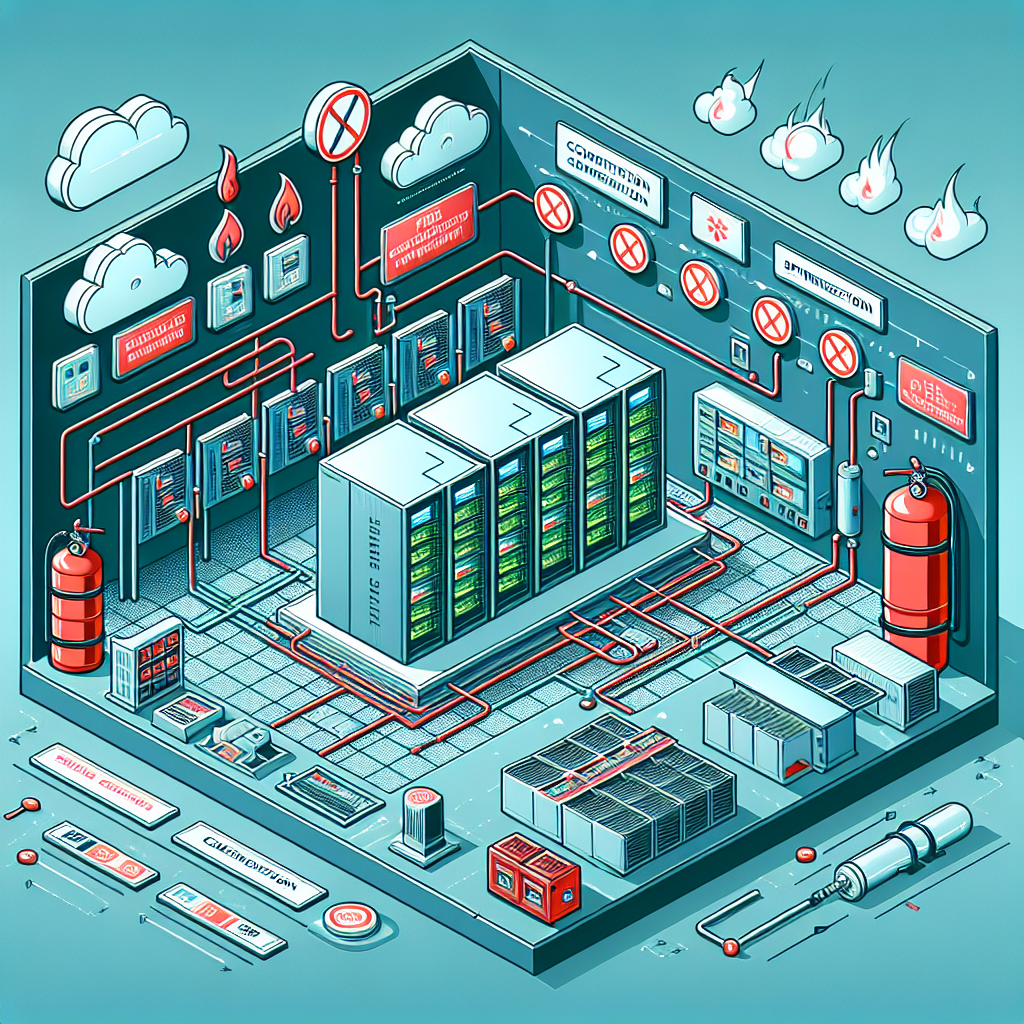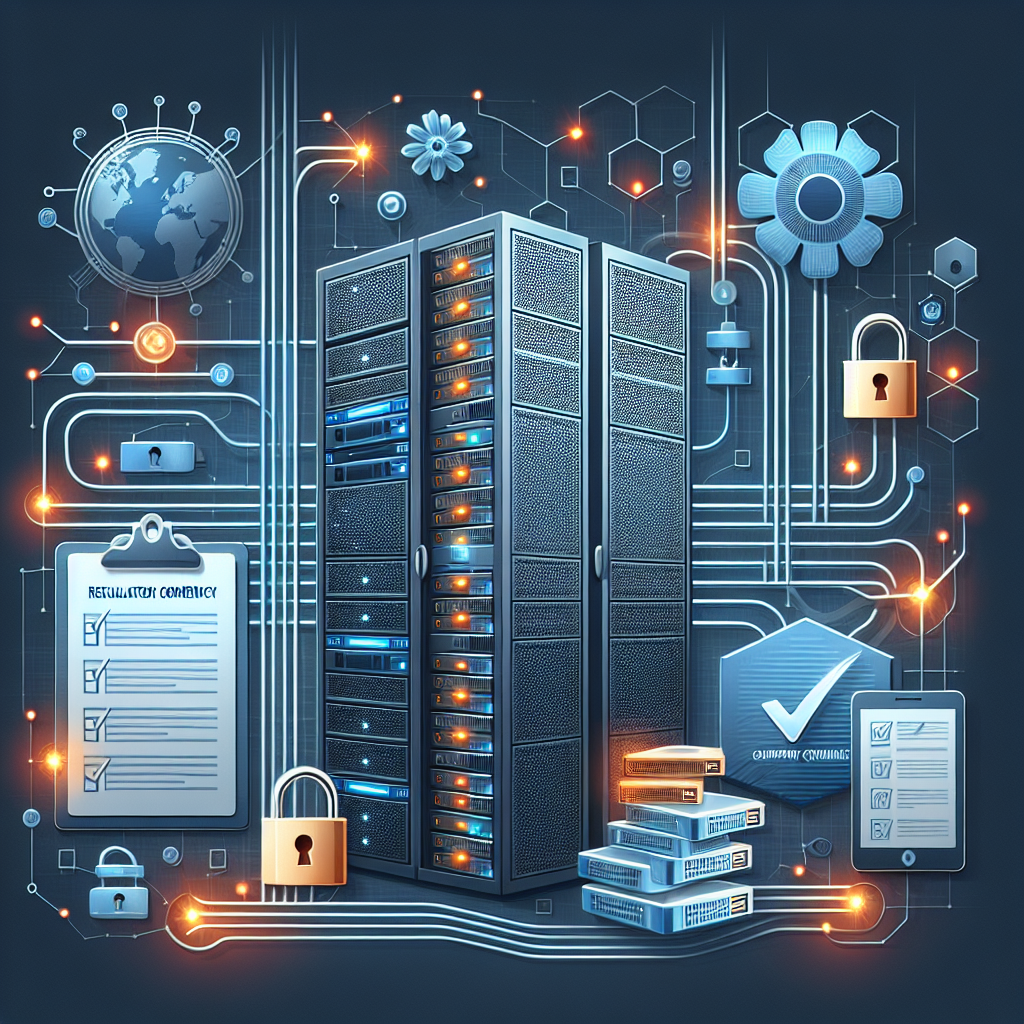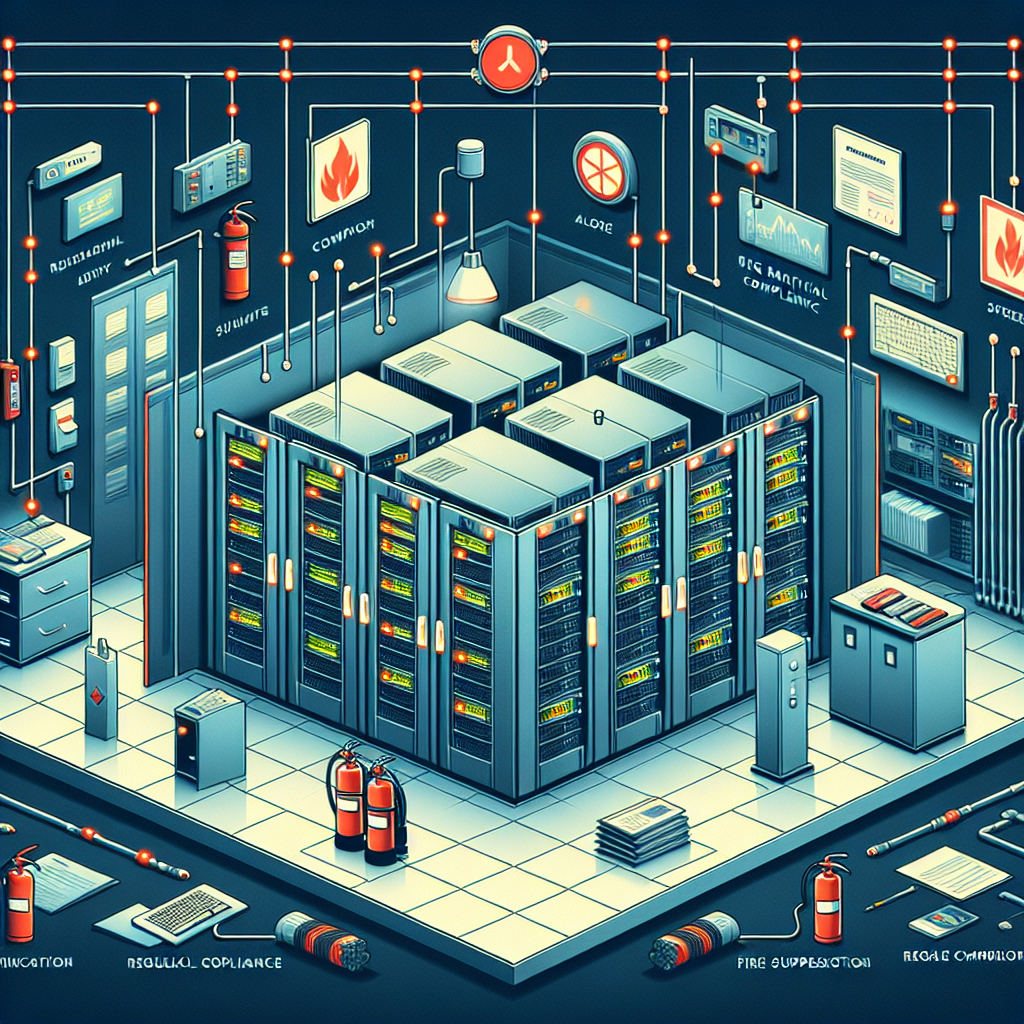Your cart is currently empty!
Tag: Regulatory

Addressing Regulatory Compliance Requirements for Data Center Fire Suppression
Data centers are critical infrastructure that house vast amounts of sensitive data and information. As such, it is vital for data center operators to address regulatory compliance requirements, especially when it comes to fire suppression systems.Regulatory compliance requirements for data center fire suppression are put in place to ensure the safety of the facility, as well as the protection of the valuable data stored within. Compliance with these regulations is not only necessary to avoid fines and penalties, but also to mitigate the risk of fire-related incidents that could result in data loss and downtime.
One of the key regulatory compliance requirements for data center fire suppression is adherence to the National Fire Protection Association (NFPA) codes and standards. The NFPA provides guidelines for the design, installation, and maintenance of fire suppression systems to ensure they are effective in extinguishing fires and protecting the facility and its occupants.
Another important regulatory requirement is compliance with local building codes and regulations. These codes may dictate specific requirements for fire suppression systems based on the size and occupancy of the data center. Failure to comply with these codes can result in costly fines and delays in obtaining necessary permits for the facility.
In addition to NFPA codes and local building regulations, data center operators must also consider compliance with industry-specific standards, such as those set forth by the Uptime Institute or the Telecommunications Industry Association (TIA). These standards provide additional guidance on best practices for fire suppression in data centers, including recommendations for redundancy and system reliability.
To address regulatory compliance requirements for data center fire suppression, operators should work closely with a qualified fire protection engineer or consultant who can assess the facility’s needs and design a system that meets all applicable regulations. Regular inspections and maintenance of the fire suppression system are also essential to ensure it remains in proper working condition and compliant with regulations.
In conclusion, addressing regulatory compliance requirements for data center fire suppression is crucial for ensuring the safety and security of the facility and its valuable data. By working with knowledgeable experts and staying up-to-date on relevant codes and standards, data center operators can mitigate the risk of fire-related incidents and ensure compliance with all regulatory requirements.

Understanding Regulatory Requirements for Data Center Compliance
In today’s digital age, data centers play a crucial role in storing and managing vast amounts of information for businesses and organizations. However, with the increasing amount of data being stored and transferred, there is a growing concern about the security and privacy of this information. This is where regulatory requirements for data center compliance come into play.Data center compliance refers to the set of rules and regulations that data centers must adhere to in order to ensure the security, integrity, and availability of the data they store. These regulations are put in place to protect sensitive information from unauthorized access, theft, or misuse.
One of the most well-known regulatory requirements for data center compliance is the General Data Protection Regulation (GDPR), which was implemented by the European Union in 2018. The GDPR sets strict guidelines for how organizations handle and protect the personal data of EU citizens. This includes requirements for data encryption, access controls, and data breach notification procedures.
In addition to the GDPR, data centers must also comply with other regulations such as the Health Insurance Portability and Accountability Act (HIPAA) for healthcare data, the Payment Card Industry Data Security Standard (PCI DSS) for credit card information, and the Sarbanes-Oxley Act (SOX) for financial data.
To ensure compliance with these regulations, data centers must implement a range of security measures and best practices. This includes implementing strong access controls, encryption protocols, and regular security audits and assessments. Data centers must also have policies and procedures in place for data backup and disaster recovery to ensure the availability of information in the event of a system failure or breach.
Furthermore, data centers must also have a clear understanding of where their data is stored and processed, as regulations may vary depending on the location of the data center. For example, data centers in the EU must comply with the GDPR, while data centers in the US must comply with regulations such as the Health Information Portability and Accountability Act (HIPAA) and the California Consumer Privacy Act (CCPA).
Overall, understanding regulatory requirements for data center compliance is essential for ensuring the security and privacy of sensitive information. By adhering to these regulations, data centers can build trust with their customers and partners, and protect their data from potential threats and breaches.

The Role of Data Center Audits in Meeting Regulatory Requirements
Data centers play a crucial role in the modern digital economy, serving as the backbone of most organizations’ IT infrastructure. With the increasing amount of sensitive data being stored and processed in data centers, it has become imperative for organizations to ensure that their data centers are operating in compliance with regulatory requirements. One of the key tools for ensuring compliance is the data center audit.Data center audits are comprehensive evaluations of a data center’s operations, processes, and security controls. These audits are conducted by third-party auditors who assess the data center against a set of predefined standards and guidelines. The goal of a data center audit is to identify any potential vulnerabilities or non-compliance issues and to provide recommendations for remediation.
Meeting regulatory requirements is a critical aspect of data center audits. Various regulations, such as the General Data Protection Regulation (GDPR), the Health Insurance Portability and Accountability Act (HIPAA), and the Payment Card Industry Data Security Standard (PCI DSS), impose strict requirements on organizations that handle sensitive data. Failure to comply with these regulations can result in severe penalties, including fines and legal liabilities.
Data center audits help organizations ensure that their data centers are compliant with these regulations. Auditors assess the data center’s physical security measures, network security controls, data encryption practices, and disaster recovery plans to ensure that they meet the regulatory requirements. By conducting regular audits, organizations can proactively identify and address any compliance issues before they escalate into significant problems.
In addition to meeting regulatory requirements, data center audits also help organizations improve the overall security and efficiency of their data centers. Auditors provide valuable insights and recommendations for enhancing security controls, streamlining processes, and optimizing resource utilization. By implementing these recommendations, organizations can strengthen their data center operations and reduce the risk of data breaches or downtime.
Furthermore, data center audits demonstrate an organization’s commitment to data security and compliance to stakeholders, including customers, partners, and regulators. By obtaining a third-party validation of their data center operations, organizations can build trust and credibility with their stakeholders, which can help enhance their reputation and competitiveness in the market.
In conclusion, data center audits play a crucial role in helping organizations meet regulatory requirements and ensure the security and efficiency of their data centers. By conducting regular audits and addressing any compliance issues in a timely manner, organizations can protect their sensitive data, mitigate regulatory risks, and demonstrate their commitment to data security and compliance.

Tips for Maintaining Data Center Compliance in an Ever-Changing Regulatory Landscape
In today’s digital age, data centers play a crucial role in storing and processing vast amounts of information for businesses and organizations. With the increasing amount of sensitive data being stored in data centers, it is essential to ensure that they are compliant with the ever-changing regulatory landscape.Data center compliance refers to the adherence to laws, regulations, and standards that govern the handling and storage of data. Failure to comply with these regulations can result in severe financial penalties, reputational damage, and even legal action. To maintain data center compliance in an ever-changing regulatory landscape, here are some tips to consider:
1. Stay informed: The regulatory landscape is constantly evolving, with new laws and regulations being introduced regularly. It is crucial for data center operators to stay informed about the latest developments in data protection and compliance regulations. This can be done by regularly monitoring industry news, attending conferences and seminars, and consulting with legal experts.
2. Conduct regular audits: Regular audits of your data center operations can help identify any compliance issues and ensure that your systems and processes are up to date with the latest regulations. Audits should cover all aspects of data center operations, including data security, access controls, and data retention policies.
3. Implement robust security measures: Data security is a key component of data center compliance. Implementing robust security measures, such as encryption, access controls, and regular security assessments, can help protect sensitive data from unauthorized access and ensure compliance with data protection regulations.
4. Train your staff: Human error is one of the leading causes of data breaches and compliance violations. Training your staff on data protection best practices, security protocols, and compliance requirements can help reduce the risk of non-compliance and ensure that data center operations are conducted in a compliant manner.
5. Partner with compliance experts: Maintaining data center compliance can be a complex and challenging task. Partnering with compliance experts, such as legal advisors or consulting firms, can provide valuable insights and guidance on how to navigate the regulatory landscape and ensure that your data center operations are compliant.
In conclusion, maintaining data center compliance in an ever-changing regulatory landscape is crucial for safeguarding sensitive data and protecting your business from legal and reputational risks. By staying informed, conducting regular audits, implementing robust security measures, training your staff, and partnering with compliance experts, you can ensure that your data center operations are conducted in a compliant manner.

Regulatory Trends in Data Center Energy Efficiency: Compliance and Beyond
In recent years, there has been a growing focus on the energy efficiency of data centers, driven by both regulatory requirements and a desire to reduce operating costs and environmental impact. As data centers continue to grow in size and number, the amount of energy they consume is also increasing, making it critical to find ways to improve efficiency and reduce energy consumption.One of the key drivers of energy efficiency in data centers is regulatory compliance. Governments around the world are increasingly enacting regulations and standards aimed at reducing energy consumption and promoting sustainability in data center operations. For example, the European Union’s Energy Efficiency Directive requires member states to develop national energy efficiency action plans, which may include measures to improve the energy efficiency of data centers.
In the United States, the Environmental Protection Agency’s ENERGY STAR program offers a certification for data centers that meet certain energy efficiency criteria. Additionally, several states have enacted regulations requiring data centers to report their energy usage and implement energy efficiency measures.
Beyond regulatory compliance, there are also industry-led initiatives aimed at improving energy efficiency in data centers. For example, the Green Grid is a global consortium of companies working to improve the energy efficiency of data centers and promote sustainability in IT operations. The Green Grid has developed several metrics and best practices for data center energy efficiency, such as Power Usage Effectiveness (PUE) and Data Center Maturity Model (DCMM).
In addition to regulatory and industry-led initiatives, there are a number of technological advancements that can help improve energy efficiency in data centers. For example, virtualization and cloud computing technologies can help reduce the number of physical servers needed, thereby decreasing energy consumption. Similarly, advances in cooling technologies, such as economizers and liquid cooling systems, can help reduce the energy needed to cool data center equipment.
Overall, the regulatory trends in data center energy efficiency are pushing organizations to prioritize sustainability and reduce their environmental impact. By complying with regulations, adopting best practices, and leveraging technological advancements, data center operators can not only improve their energy efficiency but also reduce operating costs and contribute to a more sustainable future.

Regulatory Compliance and Data Center Energy Efficiency: What You Need to Know
In today’s digital age, data centers play a crucial role in storing, processing, and managing vast amounts of information for businesses and organizations. With the increasing importance of data centers, there is a growing focus on regulatory compliance and energy efficiency to ensure the sustainability and security of these facilities.Regulatory compliance refers to the adherence to laws, regulations, and standards that govern the operation of data centers. These regulations are put in place to protect the privacy and security of data, as well as to ensure the environmentally responsible operation of these facilities. Failure to comply with these regulations can result in hefty fines, legal repercussions, and damage to a company’s reputation.
One of the key regulations that data centers must comply with is the General Data Protection Regulation (GDPR), which governs the handling of personal data of European Union citizens. Data centers must implement strict security measures to protect this data and ensure that it is not accessed or shared without proper authorization.
In addition to regulatory compliance, data center operators are also increasingly focused on energy efficiency to reduce their environmental impact and operating costs. Data centers are known to be energy-intensive facilities, consuming large amounts of electricity to power servers, cooling systems, and other equipment. By implementing energy-efficient technologies and practices, data centers can reduce their carbon footprint and save on energy costs.
There are several strategies that data center operators can employ to improve energy efficiency, such as using virtualization technology to consolidate servers, implementing hot and cold aisle containment systems to optimize airflow, and deploying energy-efficient cooling systems. These measures not only reduce energy consumption but also improve the overall performance and reliability of the data center.
To ensure regulatory compliance and energy efficiency, data center operators should conduct regular audits and assessments to identify areas for improvement. By staying informed about the latest regulations and best practices, data center operators can mitigate risks, improve operational efficiency, and demonstrate their commitment to sustainability.
In conclusion, regulatory compliance and energy efficiency are critical considerations for data center operators in today’s digital landscape. By prioritizing these aspects, data centers can enhance data security, reduce environmental impact, and optimize operational performance. By staying proactive and informed, data center operators can navigate regulatory challenges and achieve long-term success in the rapidly evolving data center industry.

Regulatory Compliance and Data Center Fire Suppression: What You Need to Know
Regulatory compliance and data center fire suppression are two critical aspects of ensuring the safety and security of a data center. With the increasing reliance on technology and data storage, it is essential for data center operators to understand the regulations and standards that govern fire suppression systems in these facilities.Regulatory compliance refers to the adherence to laws, regulations, and industry standards that are designed to protect the health, safety, and welfare of individuals and the environment. In the context of data centers, regulatory compliance includes ensuring that fire suppression systems meet the requirements set forth by organizations such as the National Fire Protection Association (NFPA) and the International Building Code (IBC).
Data center fire suppression systems are designed to quickly and effectively extinguish fires in the event of an emergency. These systems typically use a combination of water, gas, or chemical agents to suppress fires and prevent them from spreading throughout the facility. The type of fire suppression system used in a data center will depend on factors such as the size of the facility, the type of equipment being used, and the potential fire hazards present.
It is important for data center operators to understand the regulatory requirements for fire suppression systems in their facilities. Failure to comply with these regulations can result in fines, penalties, and even legal action. In addition to regulatory compliance, data center operators should also consider the best practices for fire suppression in order to protect their equipment and data.
One key aspect of data center fire suppression is the use of clean agent systems. Clean agent systems use inert gases or chemical agents to suppress fires without leaving behind any residue or damaging equipment. These systems are ideal for data centers because they are safe for use around sensitive electronic equipment and can effectively suppress fires without causing further damage.
Another important consideration for data center fire suppression is the maintenance and testing of fire suppression systems. Regular maintenance and testing of these systems are essential to ensure that they are functioning properly and will be effective in the event of a fire. Data center operators should work with qualified technicians to schedule regular inspections and testing of their fire suppression systems to ensure compliance with regulations and industry standards.
In conclusion, regulatory compliance and data center fire suppression are critical aspects of maintaining a safe and secure data center facility. Data center operators must understand the regulations and standards that govern fire suppression systems and take proactive steps to ensure that their systems are compliant and effective in the event of an emergency. By following best practices and working with qualified technicians, data center operators can protect their equipment, data, and employees from the devastating effects of a fire.

Ensuring Compliance and Regulatory Requirements with Effective Data Center Monitoring
In today’s fast-paced and data-driven business environment, ensuring compliance with regulations and meeting strict regulatory requirements is crucial for any organization. This is especially true for data centers, which house sensitive and critical information that must be protected and managed in accordance with various laws and industry standards.Effective data center monitoring is key to ensuring compliance and meeting regulatory requirements. By implementing robust monitoring tools and processes, organizations can proactively identify and address potential risks and vulnerabilities, ensuring that their data center operations are in line with regulatory guidelines.
One of the primary reasons why data center monitoring is essential for compliance is the need to maintain data integrity and security. Regulatory bodies such as the Health Insurance Portability and Accountability Act (HIPAA), the Payment Card Industry Data Security Standard (PCI DSS), and the General Data Protection Regulation (GDPR) have strict requirements for data protection and security. Failure to comply with these regulations can result in hefty fines and reputational damage.
By monitoring data center operations in real-time, organizations can quickly identify any security breaches or anomalies that may put sensitive data at risk. Monitoring tools can provide alerts and notifications for suspicious activities, unauthorized access attempts, and potential data breaches, allowing IT teams to take immediate action to mitigate risks and protect data.
In addition to security, data center monitoring is also crucial for ensuring availability and reliability. Downtime and service interruptions can have a significant impact on business operations, leading to lost revenue and damage to the organization’s reputation. Regulatory bodies may also have specific requirements for uptime and availability that must be met to remain compliant.
By monitoring critical infrastructure components such as servers, storage systems, and networking devices, organizations can proactively identify and address potential issues that may lead to downtime. Monitoring tools can provide insights into system performance, capacity utilization, and potential bottlenecks, enabling IT teams to optimize resources and ensure that data center operations meet regulatory requirements for availability and reliability.
Furthermore, data center monitoring can also help organizations demonstrate compliance to auditors and regulatory bodies. By collecting and analyzing data on key performance indicators, security events, and operational metrics, organizations can provide evidence of their adherence to regulatory guidelines and best practices. This can streamline the audit process and provide assurance to stakeholders that data center operations are being managed effectively and in compliance with regulations.
In conclusion, ensuring compliance and meeting regulatory requirements with effective data center monitoring is essential for organizations that rely on data center infrastructure to support their business operations. By implementing robust monitoring tools and processes, organizations can proactively identify and address potential risks, maintain data integrity and security, ensure availability and reliability, and demonstrate compliance to auditors and regulatory bodies. Investing in data center monitoring is not only a proactive approach to managing risks and protecting sensitive data but also a strategic decision to safeguard the organization’s reputation and maintain trust with customers and partners.

Ensuring Compliance and Regulatory Requirements Through Data Center Inspections
Data centers play a crucial role in today’s digital economy as they store and process vast amounts of data for businesses and individuals. With the increasing importance of data security and privacy, ensuring compliance with regulatory requirements is essential for data center operators. One way to achieve this is through regular data center inspections.Data center inspections are conducted to assess the facility’s compliance with industry standards, regulations, and best practices. These inspections are typically carried out by third-party auditors or regulatory agencies to ensure that data centers are following the necessary protocols to protect sensitive information and maintain operational efficiency.
During a data center inspection, auditors will examine various aspects of the facility, including physical security measures, environmental controls, network infrastructure, and data management practices. They will also review documentation related to compliance, such as security policies, disaster recovery plans, and audit logs.
By conducting regular data center inspections, organizations can identify any potential vulnerabilities or non-compliance issues and take corrective action before they lead to data breaches or regulatory penalties. Inspections also help data center operators stay up-to-date on the latest industry standards and regulations, ensuring that their facilities are always in compliance.
To ensure a successful data center inspection, organizations should establish clear policies and procedures for data center operations, document all security measures and protocols, and regularly review and update their compliance documentation. They should also work closely with auditors to address any issues that are identified during the inspection and implement necessary changes to improve their compliance posture.
In conclusion, data center inspections are a critical component of ensuring compliance with regulatory requirements and protecting sensitive data. By conducting regular inspections and addressing any non-compliance issues promptly, organizations can minimize the risk of data breaches and maintain the trust of their customers and stakeholders. Investing in data center inspections is an essential step for any organization that values data security and regulatory compliance.

Data Center Compliance: Ensuring Regulatory Compliance in a Changing Landscape
In today’s digital age, data centers play a crucial role in storing and managing vast amounts of information for businesses and organizations. With the increasing importance of data security and privacy, ensuring regulatory compliance has become a top priority for data center operators.Data center compliance refers to the adherence to various laws, regulations, and industry standards that govern the collection, storage, and processing of data. These regulations are designed to protect sensitive information and ensure that organizations handle data in a responsible and ethical manner.
In recent years, the regulatory landscape surrounding data center compliance has become increasingly complex and ever-changing. With the introduction of new laws such as the General Data Protection Regulation (GDPR) in Europe and the California Consumer Privacy Act (CCPA) in the United States, data center operators must stay up-to-date on the latest requirements to avoid potential fines and penalties.
To ensure regulatory compliance in a changing landscape, data center operators must implement robust security measures and best practices. This includes encrypting data, implementing access controls, conducting regular security audits, and training staff on data protection protocols.
Additionally, data center operators must also have a thorough understanding of the specific regulations that apply to their industry. For example, healthcare organizations must comply with the Health Insurance Portability and Accountability Act (HIPAA), while financial institutions must adhere to the Payment Card Industry Data Security Standard (PCI DSS).
One of the key challenges in maintaining regulatory compliance is the rapid pace of technological advancements. As data center technologies evolve, so do the threats to data security. This requires data center operators to continuously update their security measures and adapt to new regulatory requirements.
In order to navigate the complex landscape of data center compliance, many organizations are turning to third-party compliance experts and consultants. These experts can help data center operators assess their current compliance posture, identify gaps in their security measures, and develop a comprehensive compliance strategy.
Ultimately, ensuring regulatory compliance in a changing landscape requires a proactive approach and a commitment to data security. By staying informed on the latest regulations, implementing robust security measures, and seeking expert guidance when needed, data center operators can protect sensitive information and maintain the trust of their customers and stakeholders.
